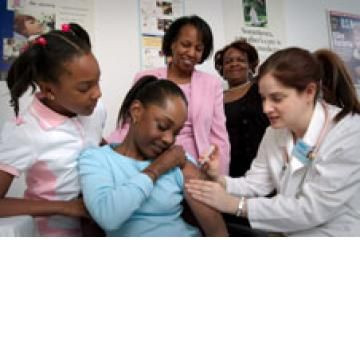Vaccination Take-up Rises for 11-12 Year-olds

Vaccination rates for the pre-teen immunizations are increasing, says the CDC (Centers for Disease Control and Prevention) who acknowledge that more work may need to be done get pre-teens to take the recommended vaccines.
Researchers found that meningococcal disease immunization increased from 8 percent to 50 percent, while DtaP, a booster for diphtheria, tetanus and whooping cough climbed from 34 to 68 percent.
“I think that this is very good news,” said Dr. Samir S. Shah an associate professor of pediatrics at the University of Cincinnati College of Medicine to Reuters.
Scientists and health officials have ramped up their efforts to promote vaccines and explain their risks and benefits.
"Parents are also becoming involved and participating in helping debunk some of the myths surrounding vaccines," Shah added.
The doctors who were involved in the study however, cautioned against over stating the benefits of this on pre-teen health, as large numbers, up to more than half, had often avoided taking the vaccine, 20 percent did not receive the recommended DT or DTaP shots and 61 percent did not get the meningococcal vaccine:
"As encouraging as these results are, there remain many adolescents 13 years or older who have not yet received all the recommended vaccines," they write in the Archives of Pediatric & Adolescent Medicine.
Reasons for avoiding the vaccine are often due to side effects; the shots can cause swelling and soreness, or doubt over the need: the vaccines involved prevent diseases received by sexual contact (HPV) or living in close quarters eg. Students in dormitories (Meningococcal), leaving mothers and young patients often in conflict over whether they need it.
The CDC has more information on vaccines for teens and preteens at http://cdc.gov/vaccines/who/teens/index.html whilst original links to the abstract of this article can be found Archives of Pediatric & Adolescent Medicine, online September 5, 2011 here. http://bit.ly/DJa42
Published by Medicaldaily.com



























